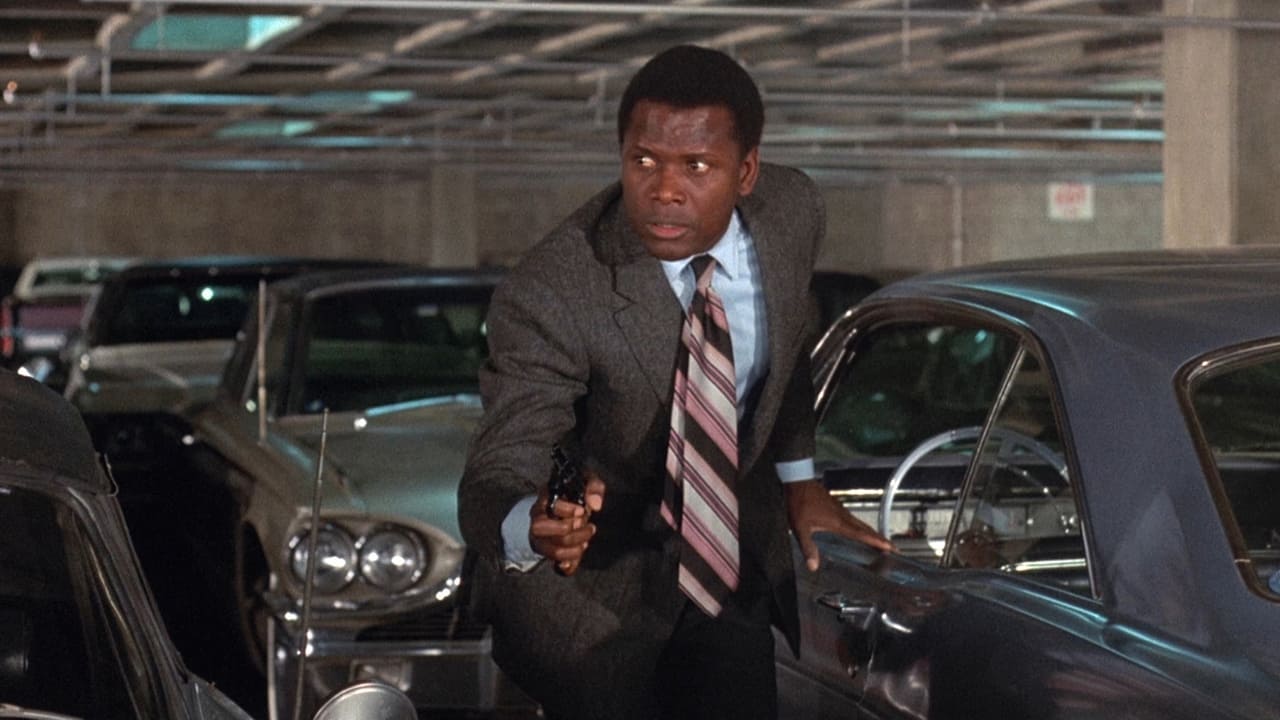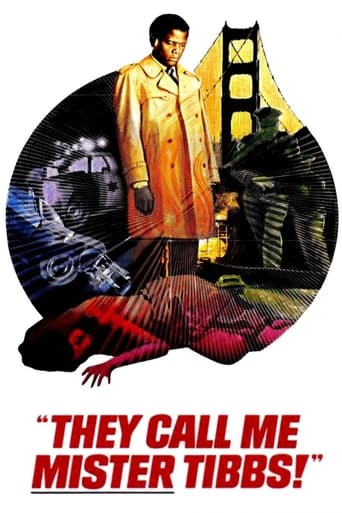



Most undeservingly overhyped movie of all time??
I wanted to like it more than I actually did... But much of the humor totally escaped me and I walked out only mildly impressed.
View MoreA film of deceptively outspoken contemporary relevance, this is cinema at its most alert, alarming and alive.
View MoreA clunky actioner with a handful of cool moments.
Even allowing for the inevitable "sequel letdown", this film is more than just a little mediocre. I doubt Poitier would have done it if he hadn't been offered a lot of money. Basically, everything that made the first film work is either missing or wrong. For example: Rod Steiger's racist cop and all the narrative friction that came with him -- gone. Quincy Jones' excellent music -- here, as stylish as ever but done in a funky style that's incongruous with the character of Virgil Tibbs and which makes the film seem more generic in a "70s blaxploitation" way than it should. The only major element still present in force is Poitier, and his performance is good. He's added a more sexual element to his performance, and finds some humor as well in the mostly dry situations. It's just not enough to power such a mediocre film.The mystery elements do not work very well. We know from the beginning that the murderer is either the really obvious guy, a landlord (Anthony Zerbe) who looks like date rape on two legs, or the slightly less obvious guy, a preacher (Martin Landau) who's an old friend of Tibbs. Landau's character is so poorly conceived that it's amazing Landau is able to do anything at all with it. BTW, with his largely black congregation and his political crusades, Landau's character more than a little resembles the infamous Oakland/San Francisco preacher Jim Jones, who would rocket to stardom a decade or so later in supremely unfortunate circumstances.To make up for the lack of "heart" (the first Tibbs movie was a buddy cop story), this film gives him a family. He's also been moved inexplicably from Philadelphia to San Francisco, but presumably the audience wasn't supposed to remember anything from the first film, right? Anyway, his home life is so dull, and so objectionable on so many levels -- after having an awkward conversation with his son about how he was "supposed to be there, the black man and all that", he hits him in the face -- that it makes a film that otherwise might have been mediocre into a disaster. Barbara McNair, whose main experience prior to this was playing a nun in an Elvis movie, must have been thrilled to share so many scenes with Poitier but she can't strike a rapport with him that makes up for the fact that we already saw an entire Virgil Tibbs movie without her. She's window dressing of the most painful sort, and the writers' attempts to make Tibbs' family life some kind of social statement is just about as successful as their attempt to make Landau's preacher into some kind of activist hero. In fact, that's the film in a nutshell -- the first movie was timeless, this one tries instead to be topical.It wouldn't be fair to close these comments without a few words about the director, Gordon Douglas: he sucks. Right from the very first shots of the movie you can tell it's a disaster: he shoots the entire murder in first person subjective camera angle, which is just as tacky and dated as extreme zooms from the same era. The fact that the producers picked a guy like Douglas, who'd been in Hollywood already for almost forty years and had directed almost 90 mediocre films, says a lot about their lack of ambition for this picture. Which is really too bad, because the original film combined genre mystery elements with social problems in a stylish way, whereas this film just plods along like any other B movie.
View MoreActually, they call him Lieutenant Tibbs. Poitier is not the same character as he was in the superior "In The Heat Of The Night," released some two years earlier. He now lives in San Francisco with a lovely wife and two cute kiddies. Only the name and the profession remain the same.Otherwise, what lifts this above the routine television crime series of the period -- "Burke's Law", "Banacek," "The Name of the Game" -- is a bigger budget and a bankable star, plus the drawing power of the title itself, a memorable line drawn from "In The Heat Of The Night." The plot: A prostitute is murdered and the available clues point to an activist minister of undetermined faith (Landau). Poitier spends most of the film tracking down other possible suspects, reluctant to see the murder pinned on his childhood friend. It ends, not happily, but with all sins paid for.The director, Gordon Douglas, had a pedestrian career. He has some distracting habits here. Often, when two people are in conversation, he doesn't shoot over one conversant's shoulder, which would give us a better sense of what's up, but rather he has the speaker look directly into the camera, sometimes in close up. I don't know why any director would do that with any frequency. What it does is draw attention to the fact that we're watching a movie, and that makes a suspension of disbelief more difficult.And it may be Douglas -- or somebody -- who is responsible for one of Poitier's poorer performances here. He's like a clone of Steve McQueen's San Francisco detective in "Bullet". Poitier is taciturn, rarely smiles, and moves about with a Zen expression. The mannerisms are especially disappointing because Poitier is one of the finest dramatic actors of his generation.Little use is made of location shooting -- a foot chase through Chinatown, a pursuit across the Golden Gate bridge into a Marin County that doesn't exist. It seems to me that some of the exteriors were shot elsewhere, probably Los Angeles, because The City seems generic. There is a clumsily staged car chase ending in a wreck. What police thriller could exist without one? Poitier gets good support though from the likes of Anthony Zerbe and Jeff Corey. Barbara McNair, as Poitier's pretty wife, isn't much help, but his son, George Spell, turns in a nice naturalistic performance.But that leads us into a problem with the script. Poitier's family life has some trumped-up problems and too much time is spent with them. The script even reduces McNair's complaints to the traditional one -- Poitier spends too much time at work and not enough with his family. She shrieks this accusation at him from a staircase, a little unconvincingly. But it's all pointless. A long scene with Poitier and Spell is irrelevant to anything that happens before or after. It diverts us from the main story, which is the murder and its solution.It's not a stupid or insulting movie. It's not part of the Blaxploitation movement popular during the 60s. Nothing is made of the race issue. The only sociopolitical point made is that Landau is working for a people's government run from store fronts, not from City Hall. It sounds "liberal" and yet it's the embodiment of "decentralization." Zerbe is described by one of his sex slaves -- the toothsome Beverly Todd -- as "AC/DC" but that plays only a small part in the plot and is not judged one way or the other.Want to see an excellent movie in a similar setting? See "Bullet" if you haven't already. Want to see an abominable and dated movie about San Francisco detectives? Try "The Laughing Policeman."
View MoreDespite the flaws noted above with regards to continuity and occasional lapses in writing, the movie is saved by the great acting provided by Sidney Poitier, Anthony Zerbe, Martin Landau, and Ed Asner (despite his short appearance). Poitier delivers the same riveting performance he did as in the successful In the Heat of the Night, adding a family life that is pretty typical for a father who is often away from his children. Anthony Zerbe is a shade better, however, in his role as sleazy landlord Rice Weedon. Zerbe was tailor-made for this role, as his ability to play bad guys is utilized perfectly. Martin Landau as the reverend does what is expected and more, adding a human quality that is even throughout. Ed Asner as the nervy manager takes everything that he had (not very much) and ran with it, making his character believable. I would recommend this movie highly to anyone who enjoys movies of this era and genre- particularly if you are fond of gritty, down in the mud reality.
View MoreThis sequel to "In the Heat of the Night" will suffer in inevitable comparisons to its infinitely better predecessor. Instead of looking like a theatrical movie edited for television, "Mister Tibbs" looks suspiciously like a TV movie edited for theatrical release, with grainy photography, cheesy opening titles, and sets that look like they're made of plywood. The murder sequence has a glaring continuity error: the camera shows two hands choking the girl, then a shot of a hand reaching for a statuette, then a shot of the girl being choked with two hands again, and finally the statuette coming down for the fatal blow. Solving the case should be easy: find the only guy with three hands! But the shoddy production values can't completely obscure this film's considerable merits: namely, Sidney Poitier's performance as the cool detective determined to follow the evidence wherever it may lead, even if it implicates a friend. Martin Landau is also convincing as the do-gooder preacher-activist suspected of brutally murdering his prostitute girlfriend. In addition to being haunted by the case, Tibbs is conflicted about his home life, but the issues of race and Tibbs' barely concealed sense of social outrage are absent here. So is the complex murder mystery that made "In the Heat of the Night" so compelling.
View More